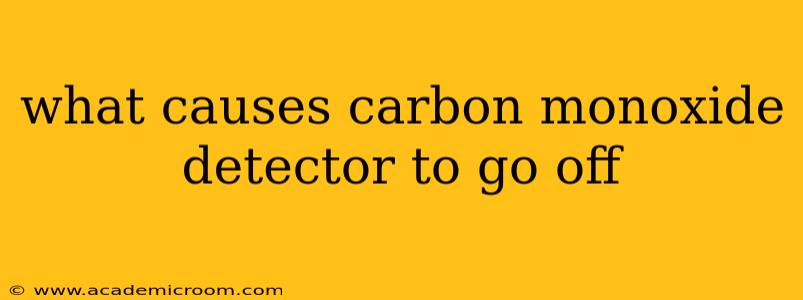What Causes a Carbon Monoxide Detector to Go Off?
A carbon monoxide (CO) detector going off is a serious event, signaling the presence of a potentially deadly, invisible gas. Understanding the reasons behind a CO alarm activation is crucial for ensuring your safety and the safety of your family. This comprehensive guide explores the common causes and what steps to take when your CO detector sounds.
H2: Common Causes of a Carbon Monoxide Detector Alarm
Several factors can trigger a carbon monoxide detector. These range from relatively minor issues easily resolved to serious emergencies requiring immediate action.
H3: Faulty Appliances:
The most significant cause of CO alarms is malfunctioning fuel-burning appliances. This includes:
- Furnaces: Cracks in the heat exchanger, a vital part of the furnace, allow CO to leak into your home. Regular maintenance, including annual inspections, is crucial to prevent this.
- Water Heaters: Similar to furnaces, cracks or corrosion in the water heater can release CO.
- Gas Stoves and Ovens: Improper ventilation or gas leaks can cause CO buildup. Ensure proper ventilation when using gas appliances.
- Fireplaces and Wood-Burning Stoves: Incomplete combustion in fireplaces and wood-burning stoves can generate significant amounts of CO. Make sure your chimney is clean and properly functioning.
- Gas Generators: Using gas generators indoors or in poorly ventilated areas is extremely dangerous and a common source of CO poisoning. Always operate generators outdoors and far away from windows or doors.
- Cars and Other Vehicles: Running a car or other vehicle in an attached garage, even with the door slightly open, can quickly lead to dangerous CO levels.
H3: Blocked Vents and Chimneys:
Proper ventilation is critical for safe operation of fuel-burning appliances. Blocked vents or chimneys prevent the safe expulsion of combustion byproducts, including CO, leading to buildup inside your home. Regular cleaning and inspection of vents and chimneys are essential for safety.
H3: Backdrafting:
Backdrafting occurs when combustion byproducts are drawn back into the home instead of being exhausted outdoors. This can be caused by high winds, low outside air pressure, or improperly installed or maintained appliances.
H3: Other Less Common Causes:
While less frequent, other factors can also trigger a CO detector:
- Manufacturing Defects: Although rare, faulty CO detectors can produce false alarms. Check the detector's expiration date and consider replacing it if it's outdated.
- Dust and Dirt: Accumulated dust and dirt can interfere with the detector's sensor, leading to false alarms. Regular cleaning is recommended according to the manufacturer's instructions.
- High Humidity: Extremely high humidity can sometimes affect the sensor’s performance.
- Electromagnetic Interference: In rare cases, strong electromagnetic fields can interfere with the detector’s operation.
H2: What to Do When Your Carbon Monoxide Detector Goes Off:
If your CO detector sounds, follow these steps immediately:
- Evacuate the premises immediately. Get everyone out of the house and move to a safe location outdoors.
- Call emergency services (911 or your local equivalent). Explain the situation clearly and provide your address.
- Do not re-enter the building until emergency responders give you the all-clear. CO is invisible, odorless, and deadly.
- Have your heating and other fuel-burning appliances checked by a qualified professional. This is crucial to identify and fix the source of the CO leak.
H2: How Often Should I Test My Carbon Monoxide Detector?
It's recommended to test your CO detector monthly. Most detectors have a test button that will initiate a self-test. Replace your CO detector every 5-7 years, or as recommended by the manufacturer.
H2: Can a CO Detector Go Off Without CO Present?
Yes, a CO detector can go off without the presence of CO. This can be due to factors such as malfunctioning appliances, dust accumulation, or even interference from other electronic devices. However, always treat a CO alarm as a serious event until it's confirmed otherwise by a qualified professional.
By understanding the potential causes of a CO detector alarm and taking prompt action, you can significantly reduce the risks associated with carbon monoxide poisoning. Remember, early detection is key to preventing serious health consequences or even fatalities.
